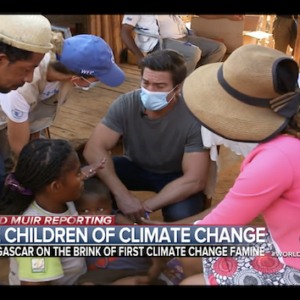
[ad_1]

(NEW YORK) — Donations have poured in from thousands of “World News Tonight” viewers in the wake of our report on Southern Madagascar, a country on the verge of the world’s first climate change-induced near-famine in modern history.
Unlike other countries, where extreme hunger and near-famine conditions are caused by war, conflict, or isolated weather events, southern Madagascar is facing these conditions because of a years-long drought caused by climate change.
The conditions there make the land here too arid to farm and leading to crop failure. The severe lack of rain has led to depleted food sources and dried-up rivers. Climate change has also led to sandstorms affecting these lands, covering formerly arable land and rendering it infertile.
“World News Tonight” anchor David Muir and his team traveled to Madagascar to report on the worsening situation, as aid organizations and the Malagasy government rush to fill in the gaps of food and water in this region.
Since our report aired Monday, the World Food Programme said they received support from more than 22,000 donors, raising $2.7 million, which will go towards helping the people of southern Madagascar.
Arduino Mangoni, the deputy country director of the World Food Programme in Madagascar, told ABC News he had “never seen people, especially children, in this situation that we’re seeing here.”
“As they cannot plant, it’s affecting their food security,” Patrick Vercammen, the World Food Programme’s emergency coordinator here, told Muir during a visit to Akanka Fokotany, an affected village. “Having sandstorms in this kind of landscape is not something usual and having the effects of sandstorms shows that nature is changing, the environment is changing, and the climate change is affecting this area more than the rest of Madagascar.”
The situation has led to widespread malnutrition affecting more than 1 million people, and pockets of what the United Nations classifies “catastrophic” food insecurity signaling deepening hunger.
Madagascar has produced 0.01 percent of the world’s annual carbon emissions in the last eight decades, but it is suffering some of the worst effects.
“It is not fair…these people have not contributed to climate change because they do not have electricity, they do not have cars etc., and they’re paying probably the highest price in terms of the consequences of climate change,” Mangoni said.
The children are the most affected, with at least half a million kids under the age of five expected to be acutely malnourished, according to the World Food Programme and UNICEF.
In fact, the agencies say about 110,000 children are already in severe condition, suffering irreversible damage to their growth.
As the country enters the lean season – that dangerous time during which people wait for the next successful harvest — the need to provide food to those at risk of starvation has become more urgent. Aid workers warning that, without action, they could run out of food resources by the end of the year.
The World Food Programme is working together with the Malagasy government to alleviate some of the most acute needs in this region; prevent and treat children experiencing malnutrition; and build infrastructure and knowledge to make the population of southern Madagascar more resilient in the face of drought. They’re supporting more than 700,000 people in dire need, and the need is expected to grow.
Click here to help families in Madagascar.
The World Food Program says:
- $7 provides a month of school meals for a child in need
- $15 provides a month’s worth of lifesaving nutrition to small-scale farmers
- $25 provides 50 mothers with nutritious meals
- $50 provides a child with a year of school meals
- $75 feeds a family of 5 for one month, providing staples like rice, vegetable oil, sugar, salt, flour, beans, and lentils
- $1,000 can feed a family of 5 for one year.
Copyright © 2021, ABC Audio. All rights reserved.
[ad_2]
Source link